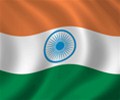

Indian retail inflation eased in July after holding above 6% for two months in a row, helped by improving supplies following the lifting of pandemic restrictions, and the government said it would take all necessary steps to contain rising prices.
Consumer prices rose 5.59% in July from the same month last year, lower than June’s 6.26% annual inflation rate and below a Reuters poll forecast of 5.78%, data released by Ministry of Statistics showed on Thursday.
Food prices, which account for nearly half of the inflation basket, rose 3.96% year-on-year in July from 5.15% a month before.
The Reserve Bank of India (RBI) held its repo rate at a record low last week, but it raised its inflation forecast amid signs that policymakers could be edging closer to tapering pandemic-induced stimulus.
But allaying these fears, Nirmala Sitharaman, India’s finance minister, told industrialists on Thursday that the economy had not so far reached the level where financial liquidity support could be withdrawn by the central bank.
Some economists said Thursday’s July inflation print was within the range of the central bank’s 2%-6% target and that price pressures appeared to be easing.
“Today’s print provides some breather to policymakers with inflation falling back within the target band,” said Garima Kapoor, an economist for institutional equities at Elara Capital.
However, she said, the expected trajectory of inflation was likely to compel the central bank to normalise policy towards the end of the fiscal year.
Inflation has heated up this year as many companies passed on rises in their input costs like steel, cement and fuel to consumers amid a pickup in overseas demand.
Retail fuel and electricity prices rose 12.38% in July while transport costs climbed 10.54% from a year ago, the data showed. However, the prices of cereals, vegetables and sugar fell in July.
The latest inflation figures come amid a fall in COVID-19 infections, and a pickup in the pace of vaccinations in the country, although many policymakers are still worried about the possibility of a third wave of the pandemic.
Core inflation, excluding volatile food and fuel costs, was estimated at between 5.94% and 6.1%, according to three economists, compared with 6.1% to 6.2% in June.
The Indian government does not release core inflation numbers.
Source: Reuters (Reporting by Manoj Kumar and Aftab Ahmed; Additonal reporting by Rama Venkat in BENGALURU; Editing by Jason Neely and Hugh Lawson)